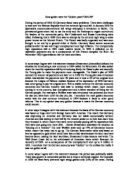Explain the Main Features of Weimar Germanys Golden Years Between 1925-1929
There where many events between the years of 1925-1929 in Weimar Germany that were seen as golden years. The diplomatic skills of Gustav Stresemann, the foreign minister allowed Germany to excel in foreign affairs. Politically Stresemann wanted to improve relations between Germany and the rest of Europe and also the USA. In 1925 the Locarno Treaty took place and Germany accepted the borders with France and Belgium that were agreed in the Treaty of Versailles. Germany accepted that the Rhineland would remain a demilitarised zone. Also France and Germany agreed to settle any disputes. This meant that they would respect the German boundaries and would not invade as well. With these terms agreed it meant that the Weimar did not have to worry about being under attack and because of these political agreements that these events were one of the main features in the Weimar’s golden years. Also another feature in foreign policy was the introduction of Germany to the League of Nations on September 8th 1926. With this the Germans were given great power and status on the league council with the power of veto. With this it enabled Germany to raise matters of German interest. The introduction of Germany to the league of nations was definitely a major feature in the golden years between 1925-1929 because talking with the likes of Britain and France in the League of nations assembly was a huge step for Germany's ranking with the rest of the world.







